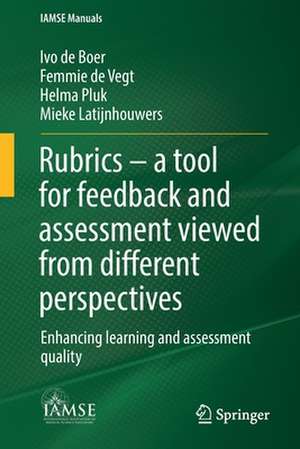Rubrics – a tool for feedback and assessment viewed from different perspectives: Enhancing learning and assessment quality: IAMSE Manuals
Autor Ivo de Boer, Femmie de Vegt, Helma Pluk, Mieke Latijnhouwersen Limba Engleză Paperback – 18 noi 2021
The objectives of the manual include guiding health sciences educators in:
- Providing useful, actionable and efficient feedback to students on assignments using a structured format (i.e. using rubrics)
- Implementing a learning culture where giving “rich feedback” is standard practice
- Using rubrics to increase quality of assessment of assignments (validity, reliability, transparency)
- Incorporating, in the instructionalsetting, latest insights in the appropriate use of rubrics in the health sciences education setting.
Preț: 432.81 lei
Nou
Puncte Express: 649
Preț estimativ în valută:
82.84€ • 90.02$ • 69.63£
82.84€ • 90.02$ • 69.63£
Carte tipărită la comandă
Livrare economică 17-23 aprilie
Preluare comenzi: 021 569.72.76
Specificații
ISBN-13: 9783030868475
ISBN-10: 3030868478
Pagini: 50
Ilustrații: X, 50 p. 16 illus., 10 illus. in color.
Dimensiuni: 155 x 235 mm
Greutate: 0.1 kg
Ediția:1st ed. 2021
Editura: Springer International Publishing
Colecția Springer
Seria IAMSE Manuals
Locul publicării:Cham, Switzerland
ISBN-10: 3030868478
Pagini: 50
Ilustrații: X, 50 p. 16 illus., 10 illus. in color.
Dimensiuni: 155 x 235 mm
Greutate: 0.1 kg
Ediția:1st ed. 2021
Editura: Springer International Publishing
Colecția Springer
Seria IAMSE Manuals
Locul publicării:Cham, Switzerland
Cuprins
Chapter 1: Rubrics a start.- Chapter 2: Rubrics best practices.- Chapter 3:Perspectives on rubrics.
Notă biografică
Ivo de Boer (MA) currently works at the Center for Innovation in Medical Education at Leiden University Medical Center (LUMC). As an educational advisor he is involved in curriculum development, policy development, and teacher training. Although working for all programs at LUMC, his main focus lies on the biomedical sciences programs (bachelor and master). From 2003 until 2014 he worked in faculty development for Inholland university of applied sciences as educational (policy) advisor and combined this with roles as tutor, teacher trainer and project manager.
Dr. Femmie de Vegt is an associate professor and principal lecturer in epidemiology education at Radboud University Medical Centre Nijmegen, the Netherlands. She is educator and coordinator in several courses on epidemiology and research methodology in the bachelor and master curricula of Biomedical Sciences and Medicine. Since 2008 she is program coordinator for the specialization Epidemiology (master Biomedical Sciences). Since 2018 she is member of the Educational Management Team for the master Biomedical Sciences.
Dr. Helma Pluk is principal lecturer at the departments of Biochemistry and Radboudumc Health Academy, Radboudumc, Nijmegen, The Netherlands. She teaches, innovates and coordinates Biochemistry and Molecular Biology courses at Bachelor and Master level at Radboud University Nijmegen and Radboudumc. Since 2011 she is also program coordinator of the Research Master's Program Molecular Mechanisms of Disease and policy advisor for the Bachelor programs Medicine and Biomedical Sciences (Radboud University Nijmegen/Radboudumc).
Dr. Mieke Latijnhouwers currently works at the Education Support Centre of Wageningen University, Wageningen, The Netherlands. As assessment expert she is involved in faculty development and projects regarding assessment quality for all BSc and MSc programmes. In addition she is advisor to the universities examining boards. From 2003 until 2019 she worked at Radboud University Medical Centre. First as head of the education coordination unit, combining organisational and policy tasks regarding the (bio)medical curricula. And from 2011 onwards as member of the educationalist expertise team, with assessment as her specialty.
Dr. Femmie de Vegt is an associate professor and principal lecturer in epidemiology education at Radboud University Medical Centre Nijmegen, the Netherlands. She is educator and coordinator in several courses on epidemiology and research methodology in the bachelor and master curricula of Biomedical Sciences and Medicine. Since 2008 she is program coordinator for the specialization Epidemiology (master Biomedical Sciences). Since 2018 she is member of the Educational Management Team for the master Biomedical Sciences.
Dr. Helma Pluk is principal lecturer at the departments of Biochemistry and Radboudumc Health Academy, Radboudumc, Nijmegen, The Netherlands. She teaches, innovates and coordinates Biochemistry and Molecular Biology courses at Bachelor and Master level at Radboud University Nijmegen and Radboudumc. Since 2011 she is also program coordinator of the Research Master's Program Molecular Mechanisms of Disease and policy advisor for the Bachelor programs Medicine and Biomedical Sciences (Radboud University Nijmegen/Radboudumc).
Dr. Mieke Latijnhouwers currently works at the Education Support Centre of Wageningen University, Wageningen, The Netherlands. As assessment expert she is involved in faculty development and projects regarding assessment quality for all BSc and MSc programmes. In addition she is advisor to the universities examining boards. From 2003 until 2019 she worked at Radboud University Medical Centre. First as head of the education coordination unit, combining organisational and policy tasks regarding the (bio)medical curricula. And from 2011 onwards as member of the educationalist expertise team, with assessment as her specialty.
Textul de pe ultima copertă
This IAMSE Manual describes how to use rubrics in higher education, especially in the highly specialized health sciences education setting. The book provides a conceptual framework, practices and a series of checklists that lecturers can use to design their own rubrics for a variety of situations and content. It highlights varying perspectives, from teachers, students, educational advisors, and curriculum managers, while providing practical tips for developing and using rubrics.
The objectives of the manual include guiding health sciences educators in:
The objectives of the manual include guiding health sciences educators in:
- Providing useful, actionable and efficient feedback to students on assignments using a structured format (i.e. using rubrics)
- Implementing a learning culture where giving “rich feedback” is standard practice
- Using rubrics to increase quality of assessment of assignments (validity, reliability, transparency)
- Incorporating, in the instructionalsetting, latest insights in the appropriate use of rubrics in the health sciences education setting.
Caracteristici
Provides concise, user friendly “how-to-guidance” for health professions educators Makes connections with cutting-edge pedagogical models Shows informative practices Portrays perspectives from different stakeholders: students, teachers, educational advisors and curriculum managers






